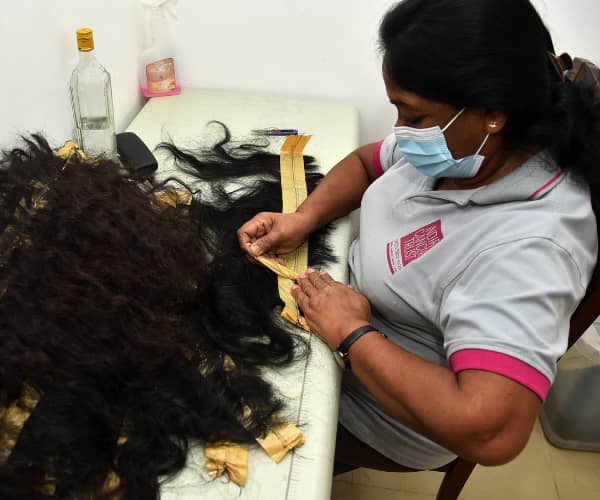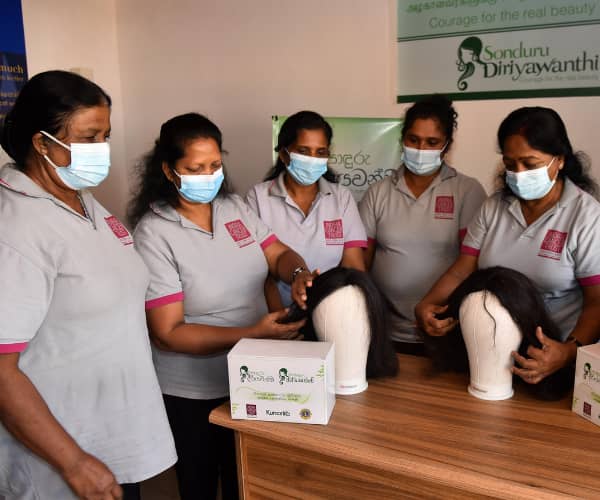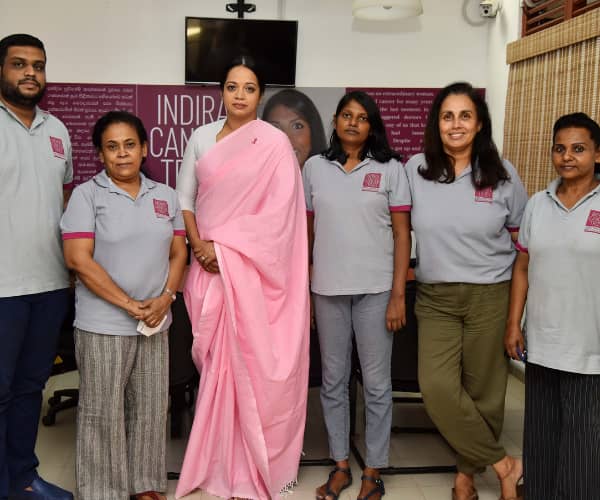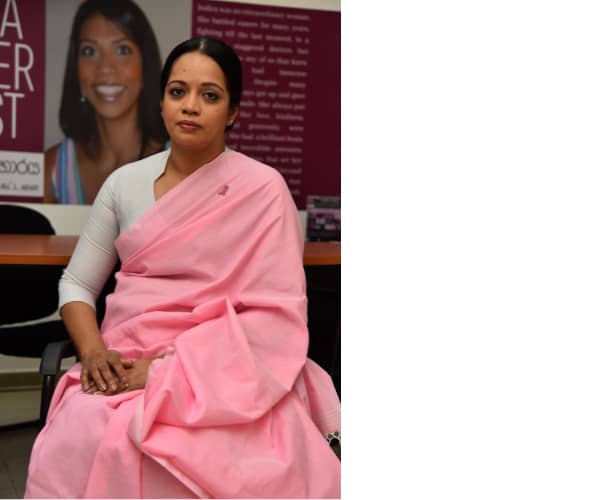
Jan 31 2022.
views 2315


Dr. Lanka Jayasuriya Dissanayake is a medical graduate who obtained her Bachelor of Medicine and Bachelor of Surgery (MBChB) from Leeds University, UK followed by an MBA in Healthcare Sciences from Manipal University, India. She currently serves as the Chairperson/Trustee Indira Cancer Trust, which is a Non-Governmental Organisation supporting patients with cancer and their families with over 20 projects. Additionally, she also works as a Director at Surya Foundation, Gamini Dissanayake Foundation, and NCD Alliance Lanka.
She has a special interest in patients' rights and responsibilities and is involved at the national level to initiate this process. With the setting up of the Indira Cancer Trust, as well as Sri Lanka’s first Paediatric Palliative Care Centre in Sri Lanka, Suwa Arana, she has a special interest in palliative and end of life care. She is the elder daughter of the former speaker of parliament Hon Karu Jayasuriya and Dr (Mrs) Vasantha Jayasuriya and is the wife of former Minister of Plantation Industries, Hon Navin Dissanayake. They have two daughters Samadhee and Mahita.

q What made you take to the medical profession? is it a career or a passion/commitment?
Being a Doctor was always a childhood dream. In retrospect, it may be because I saw my mother work as a doctor and had multiple opportunities to help her with her regular work at the Colombo Municipal Council as well as the voluntary work she did outside her work hours. Medicine is about HEALING. Being in the medical profession has given me an opportunity to do exactly that. My medical career has spanned over 24 years and I have had many opportunities to work in different settings which I am most thankful for. After graduating from Leeds University in the UK in 1998 and working in the UK for 11/2 years I returned to Sri Lanka and worked at the National Hospital of Sri Lanka, Nawaloka Hospital, Apollo Hospitals, Sri Lanka Red Cross Society, and finally at the World Health Organisation.
I worked at WHO for over 8 years looking after the areas of Non Communicable diseases including Cancer, the Elderly, Disability, Road Traffic Injuries, and the Tobacco Free Initiative. This gave me a solid foundation of the global scenarios and best practices of initiatives that would support the country. Many skills were also gained during that tenure including different training to build capacity. I also completed my MBA in Health Care Services just prior to entering the UN system and this helped me enhance my knowledge outside of medicine.
So for me, medicine is my passion and an opportunity granted to me to help and care for another.
q You spent a large proportion of your schooling and university life in the UK. How did the secondary education there give you the moral fibre to be who you are today and achieve what you did?
Looking back at our life I think both my sister and I were very fortunate to have had parents who looked into all our needs and gave us a solid foundation by instilling the correct values in us. Our world was turned upside down though in 1989 because this was the year that my father was involved in the first privatization in Sri Lanka and there was a threat to his life which we as a family physically witnessed. This prompted our parents to send us to the UK. Having been raised in a very conservative and close family set up the move to a boarding school in the UK was difficult. I was 15 years old and my sister was only 12. This boarding school was run by the Moravian church and we were the only two girls of Asian origin. We missed home so much but managed our time and learned to be independent. It was this experience in the UK that has helped us to be moulded into individuals that we are/were, thanks to the solid foundation given by my parents.
q What led to the setting up of the Indira Trust?
My sister Indira was just 31 years old when she was diagnosed with breast cancer. It was a real shock, as she had no family history of the disease. My sister had always wanted to have a family and so after the treatment was completed and she was given the all-clear – she had her daughter, Thilini, now 9 years old. Three years later when she was six months pregnant with her second child, she began experiencing pains and was diagnosed with secondary breast cancer. Her son Dylan, now a healthy six-year-old, was delivered prematurely by cesarean section in May 2015, so that my sister could begin her treatment as soon as possible.
Cancer diagnosis itself is a traumatic experience and this was no different for us. Her breast lump was detected and when it turned out to be cancer it shattered all of us. She fought it through until the end, with a smile on her face. The care she received from the hospital in the UK, the staff, and other supporting members in the hospital was amazing. She was unconscious for 7 days and my father was at her bedside holding her hand every single day with the rest of the family. We saw her right to her peaceful end, and this is what prompted my father to start a cancer initiative in Sri Lanka.
My sister died on the 2 November 2016: Her funeral was on the 10 November 2016 and we set up an organization to support patients and their families with cancer on 27 November 2017. We have not looked back since then.
q What are the ongoing projects at the Indira cancer trust?
The Indira Cancer Trust was started in 2016 and to date, we do over 20 projects that support patients with cancer and their families. This includes Sri Lanka’s first helpline for cancer, livelihood support, children’s scholarship schemes, help with medications, investigations, equipment, provision of dry rations, programme that support children with cancer, and much more. There are also several landmark projects that are being done as the world’s first and also Sri Lanka’s first. The biggest project yet for the Indira Cancer Trust is “Suwa Arana” Sri Lanka’s first Paediatric Palliative Care Centre that is being built near the Apeksha Hospital Maharagama. We hope to open the doors to children stricken by cancer in February 2023. We also provide natural customised hair wigs to patients with cancer who undergo chemotherapy – we have given over 1600 wigs and we are very thankful for the support of Ramani Fernando who through her salons has given her time and unstinted support to this project. We have stopped taking hair now but hope to re-start next year. We have also now upgraded from hand wefted wigs to machine wefted wigs through the program sondurudiriyawanthi which is a collaborative effort of Kumarika and the Lions clubs of Galkissa and Bentota.
q Who Supports you in your endeavours with the Indira Cancer Trust? How do you finance what you do? How many hands on staff do you have?
The Indira Cancer Trust is the youngest organisation in Sri Lanka working in the field of cancer and we are just 5 years old. All our achievements to date are a result of the support we received. All programmes are handled by a very committed team that includes 3 staff members, 10 volunteer coordinators and a pool of over 600 volunteers - this is the strength of the organization and all programme implementation is handled by the staff and coordinators. Since setting up Sri Lanka’s first natural hair wig production unit, we now have recruited a further 5 persons who are affected by cancer in terms of a family member being affected or they have lost a loved one to cancer. This team produces wigs to be given to patients with cancer who have lost their hair due to chemotherapy.
Patients are placed at the centre of our services and the support we receive from well wishers and donors enable us to continue our work. Maintaining transparency as an organisation is key to us and all funds raised are directly tagged to programmes and continuous assessment occurs both qualitatively and quantitatively with monthly financial accounts and audits done.
Our current turnover for a month for the programme is about 1million but this will increase with the opening of Suwa Arana - Sri Lanka’s first paediatric Palliative Care Centre for children with Cancer. We raise funds by writing proposals and sharing information on what we do and also approaching donors. We welcome anyone to visit the trust personally or keep updated on the work we do on our website www.indiracancertrust.org / Facebook, Instagram, or Twitter.
q Could you please elaborate on your latest project Suwa Arana? International Childhood Cancer Day (ICCD) – how do you propose marking this day? Also, do these international days really achieve anything of significance?
For so many families, the fight against cancer is personal. When a person you love is diagnosed with cancer, it stops your heart and throws your world off its axis. That fear and heartache are only multiplied when cancer strikes a child.
In Sri Lanka every year 750 children are newly diagnosed with cancer and Apeksha Hospital Maharagama, established in 1958 is the only specialized hospital for Paediatric Cancer in Sri Lanka. The paediatric wards can accommodate 150 children and the outpatient clinics see approximately 100 patients daily who visit from all over Sri Lanka.
Suwa Arana - A place of healing will do exactly that. This is Sri Lanka’s first Paediatriic Palliative Care Centre and will also provide accommodation to children with cancer and their families, all provided free. The main purpose of setting this up will be to provide individualized blending of care directed at underlying illness and physical, emotional, social, and spiritual needs of child and family with continued re-evaluation and adjustment.
The building of Suwa Arana commenced on February 15 February 2021 - International Childhood Cancer Day and we aim to finish this by February 2023. The total cost of the project is LKR 425million and to date, we have raised 50% of the same. The building is within walking distance from Apeksha Hospital Maharagama, has 6 Floors with 4 Patient Room Floors and a total of 32 en-suite family rooms, emphasizing Family Centred Care (FCC), rooftop garden, ground floor dining, specialised kitchen, and a recreational area.
We chose International Childhood Cancer Day (ICCD) to start the work on Paediatric Palliative care because of its significance. ICCD is a global collaborative campaign to raise awareness about childhood cancer and to express support for children and adolescents with cancer, the survivors, and their families.
This year too we will emphasise Suwa Arana and its importance and our plans to raise awareness on paediatric palliative care which is essential for every country. The theme for this year is 'Better Survival’ is achievable #throughyourhands “Right care at the right time by the right team” is what is emphasized.
q What percentage of Sri Lanka’s population is affected by cancer and of that how many are children?
The burden of cancer in Sri Lanka is on the rise and this includes the number of patients diagnosed as well as cancer-related deaths. 75% of the deaths in Sri Lanka as well as globally are due to Non-Communicable Diseases of which cancer is one. In Sri Lanka, about 23,500 new cases of cancer are diagnosed every year and annually there are about 14,000 deaths from Cancer. These figures are expected to rise by 25% every year.
The cancer services in Sri Lanka are predominantly provided by the state sector free of charge to the general public. With the establishment of the National Cancer Control Program as well as the related policies, there is a considerable improvement in the cancer services provided island-wide... Whilst all services must be in place to support patients diagnosed with cancer for treatment and other support services, all countries must invest in a solid preventive and early detection campaign.
Prevention of cancer is the same for all Non Communicable diseases and there are ample advocacy campaigns that are available for prevention activities targeting healthy lifestyles with clear messages on Healthy Diets, Physical Activity, Tobacco, and Alcohol avoidance. So prevention messages are available and Sri Lanka is aware of them. There is also early detection campaigns for the commonest cancers including breast, oral cancer as well as cervical cancer which are being conducted by the Ministry of Health
q We see your team at ICT in pink at most events and also Mr. Roshan Mahanama is doing a lot of work for Breast Cancer. We have seen a lot of Cancer Awareness programmes but yours is very different. TLC and a pink Wednesday Campaign – Can you explain?
Breast Cancer is the most common cancer among women globally and locally. There are 12 persons diagnosed with Breast Cancer daily in Sri Lanka whilst every day 2 people die of breast cancer. The sad part is that breast cancer is curable and yet we see so many people dying from Breast Cancer. This is the exact reason why we started TLC – without confining our campaigns to the month of October. There is an easy action which can be taken by each and every woman above 20 years of age and it costs nothing and only takes 5 minutes of your time every month. This campaign was started by Breast Cancer UK after a lot of research and to date has been carried out in many countries. Scientific research has shown that the TLC campaign has been effective in initiating a behavioral change of the general public to start examining themselves
Mr. Roshan Mahanama initiated the pink Wednesday concept and he has been silently conveying this message for many years. In 2020 during the October 2020 Breast Cancer month activities at the Indira Cancer Trust, we contacted Mr. Mahanama and initiated a campaign for Pink Wednesday which was launched on the first Wednesday of 2021 – 6th January. We carry the message on social media and practice the Pink Wednesday, with the ICT team wearing pink and also posting specific messages on social media. We try to connect with different organisations and encourage them to practice Pink Wednesday by wearing pink and a pink ribbon in order to remind the public of the need for self-breast examinations.
The pink ribbon and the colour pink are associated with breast cancer and normally the month of October is considered the pink Month. Mr. Roshan Mahanama initiated Pink Wednesdays as he has a mother, wife, 3 daughters, and now a granddaughter and feels that he has to be responsible and ensure that the ladies in his life are looked after and he needed to do his part. Wearing pink on a Wednesday is a reminder of Breast cancer and especially the message that all women above 20 years need to examine themselves.
q Why is there a stigma in talking about cancer in public?
CANCER – This is a taboo word and one that instills so much fear and apprehension for anyone who utters the word – why is this? Because cancer is associated with death, so much suffering, hair loss, and being shunned away from society. With advancements in treatment and early detection, cancer is curable. Unfortunately losing a breast through surgery and hair loss has many implications that a woman has to face from society. This is the exact reason that there is stigma talking about it in public. With the loss of one’s breast, there is now the option of breast reconstruction and if this option is not available then a breast prosthesis can be given. Unfortunately, hair loss is also a major cause of concern and a major reason for stigma. This is an unfortunate side effect of the treatment and yet reversible. The difficulties patients face during treatment are immense and that is why we started Sri Lanka’s first wig donation program.
Whilst we address the stigma by reversing or addressing physical concerns there MUST be provision to change attitudes of persons so that the word cancer doesn’t shun people away and doesn’t evoke sympathy. It should be treated like any other disease. That is our fervent wish and what we strive to achieve.
q You also launched a significant project in October this year “SonduruDiriyawanthi” and you have also been working with Ramani Fernando Salons on collecting hair to make wigs. This is the world’s first continuous hair donation program and also Sri Lanka’s first Wig donation program. Can you elaborate on this?
The hair donation program is a much talked about the programme here and we are so happy to have started this in 2017 with the support of Mrs. Ramani Fernando. We have stopped this now as we have adequate hair and plan to restart when the current hair stock is over. We have collected hair from around 120,000 people and we have also given about 2000 wigs to patients.
We earlier gave only 30-40 wigs as everything was done by hand and it took time as well as a high cost for the process. With the help of Lions Club Bentota Galkissa and Hemas, we have now set up Sri Lanka’s first wig production unit where we aim to produce 500 wigs a month. These wigs are not only given out free of charge to patients from the Indira Cancer Trust premises but are also being distributed to 10 hospitals that have the highest number of cancer patients in Sri Lanka. This initiative is called SonduruDiriyawanthi.
The stigma and problems that a cancer patient faces due to hair loss can’t be explained in words it must be experienced, hence these wigs change lives.
q What major challenges does the trust face?
Post covid have you found that fundraising has become more difficult and how do you manage this all-important aspect of your work.
The challenges we face are always met with positivity and so far we have been able to overcome them all. I am a firm believer in the fact that when things are done with good intentions everything will work out well! For us at the moment there are two challenges – the first is we have embarked on the biggest project yet for the Indira Cancer Trust and a nationally important project by setting up Suwa Arana – Sri Lanka’s first Paediatric Palliative Care Centre. We have raised 50% of the funds needed and the remaining 50% need to be raised amidst these challenging economic times. But again we are so thankful to everyone who has come forward to support us and I am sure many more will also support us so that we are able to open the doors of Suwa Arana to children with cancer by February 2023.
The other challenge is the increasing number of patients requesting support. Again we have always supported patients through our existing system and have also revamped the system to address the COVID situation. The COVID situation did have an impact on us as we had to discontinue the regular weekly relaxation programmes (Art Therapy, Yoga Therapy, and Music Therapy) that were held at the ApekshaHospital Maharagama. The visits by volunteers to the hospital also stopped but we continue to support patients as patients walk into our office which is a few steps away from the Apeksha Hospital Maharaganma
q How do you manage a work-life balance with all that you do? Do your husband and children support you?
Whatever I have achieved today is because of my family. As I explained earlier the strength that my parents gave me and continue to do so is enhanced by the support that I get from my husband and my two daughters who support, understand, and encourage everything that I do. My husband is my strength as are our two daughters Samadhee and Mahita.
Working with the Indira Cancer trust is not a 9-4 job and requires me to work at all times, but I manage somehow together with my duties as a wife and a mother which is of the utmost importance. I will not be able to do any of the work at the trust if not for them. Both my two daughters volunteer at the Indira Cancer Trust and are part of the Indira Cancer Trust junior volunteer mentor team that also encourages young people to volunteer. My husband is not in parliament now but he continues his work as an attorney at law and also heads two foundations, the Gamini Dissanayake foundation, and the Cricket Foundation. Education, vocational training, and cricket are some of his keen interests. The COVID situation and fewer political commitments for Navin made us spend a lot of time together as a family for which I am so thankful.
q What for you has been the most rewarding moments in your crusade against cancer?
My medical career has spanned over 24 years and I have had many opportunities to work in different settings which I am most thankful for. My personal Crusade against cancer started in 2016 when I resigned from the WHO to help my father’s vision of setting up an organization to help patients with cancer. The reward comes back to us 5 years later when we look at the organization, its strengths which are the volunteers, our team, and the processes we have put in place to serve patients. Transparency and accountability are at the heart of everything we do and today we have set up a system in an organization that is strong enough to withstand anything. That is the most rewarding experience – because this ensures that support to patients continues.
q How can one contribute and be a part of this project?
The best way to support a patient is by giving your time, that is by volunteering. We have many programmes of support and due to COVID we also now have virtual volunteering. In addition, you can also support the programs we do. We also would like to invite you to support the landmark project Suwa Arana, where you can even sponsor a room in the name of your loved one who may have to battle cancer. You can also contribute by purchasing ELLE the mascot for Suwa Arana for your loved one where the proceeds go for the Suwa Arana Building fund.
What do you envision for the future- for the trust and for those afflicted by cancer- an alarmingly large proportion of society as of today- and growing?
For everyone suffering from Cancer, we say this “ Cancer is NOT a death sentence and there is LIFE after the diagnosis”!This is the message we want everyone to always remember. It is like another disease, like heart or diabetes, and with correct treatment and early detection you will get back to normal.
The future for the trust is to be there for anyone who was diagnosed with cancer and their family members, to give them the strength and support to accept the diagnosis, ensure they get treatment and be there in whatever ways possible to help them through this journey to recovery. The SuwaArana project is Sri Lanka's first – and is of national importance and we will ensure that a child with cancer and their family will receive every support they need.
By Anusha David
Pix By Nisal Baduge
0 Comments